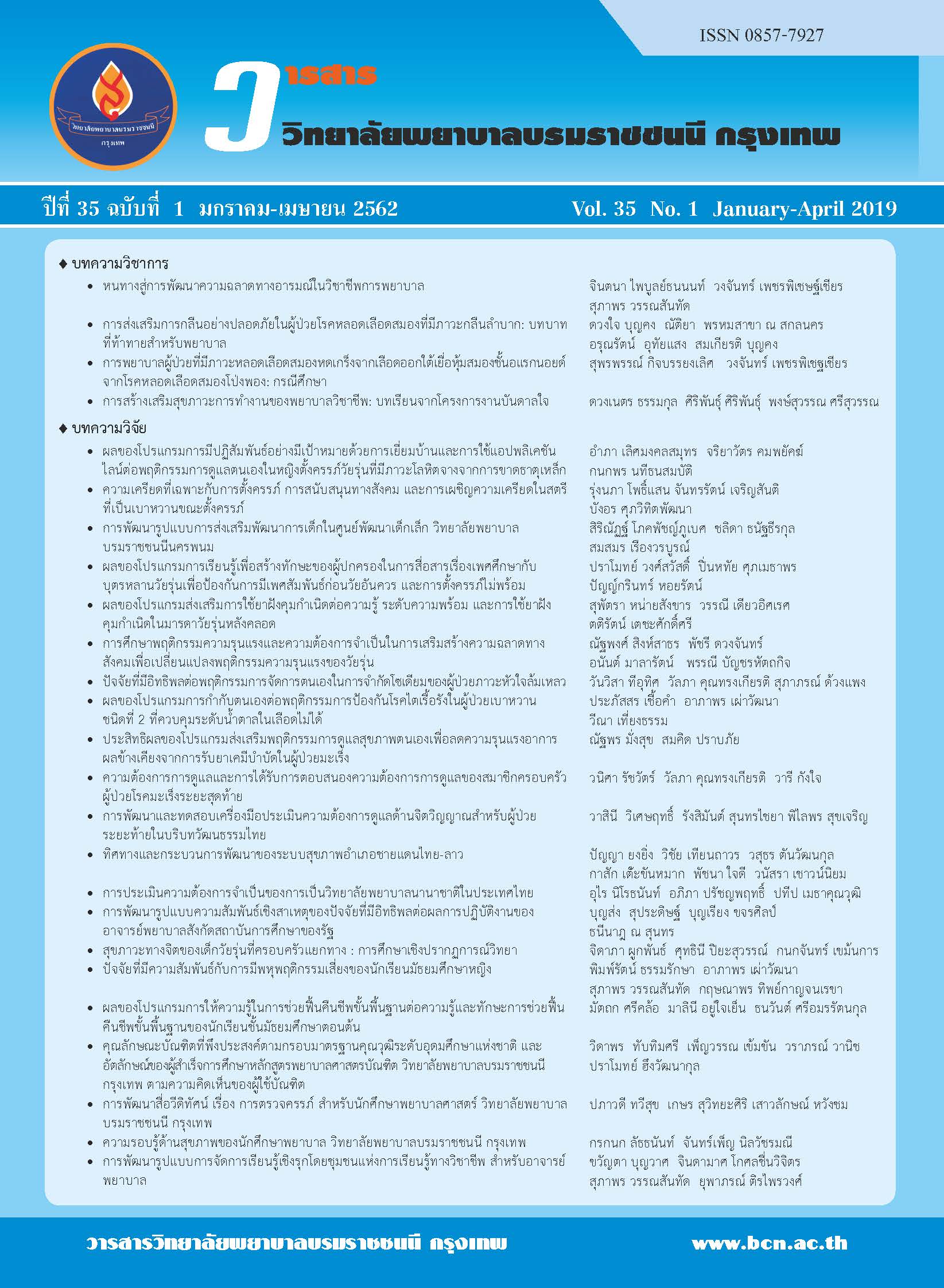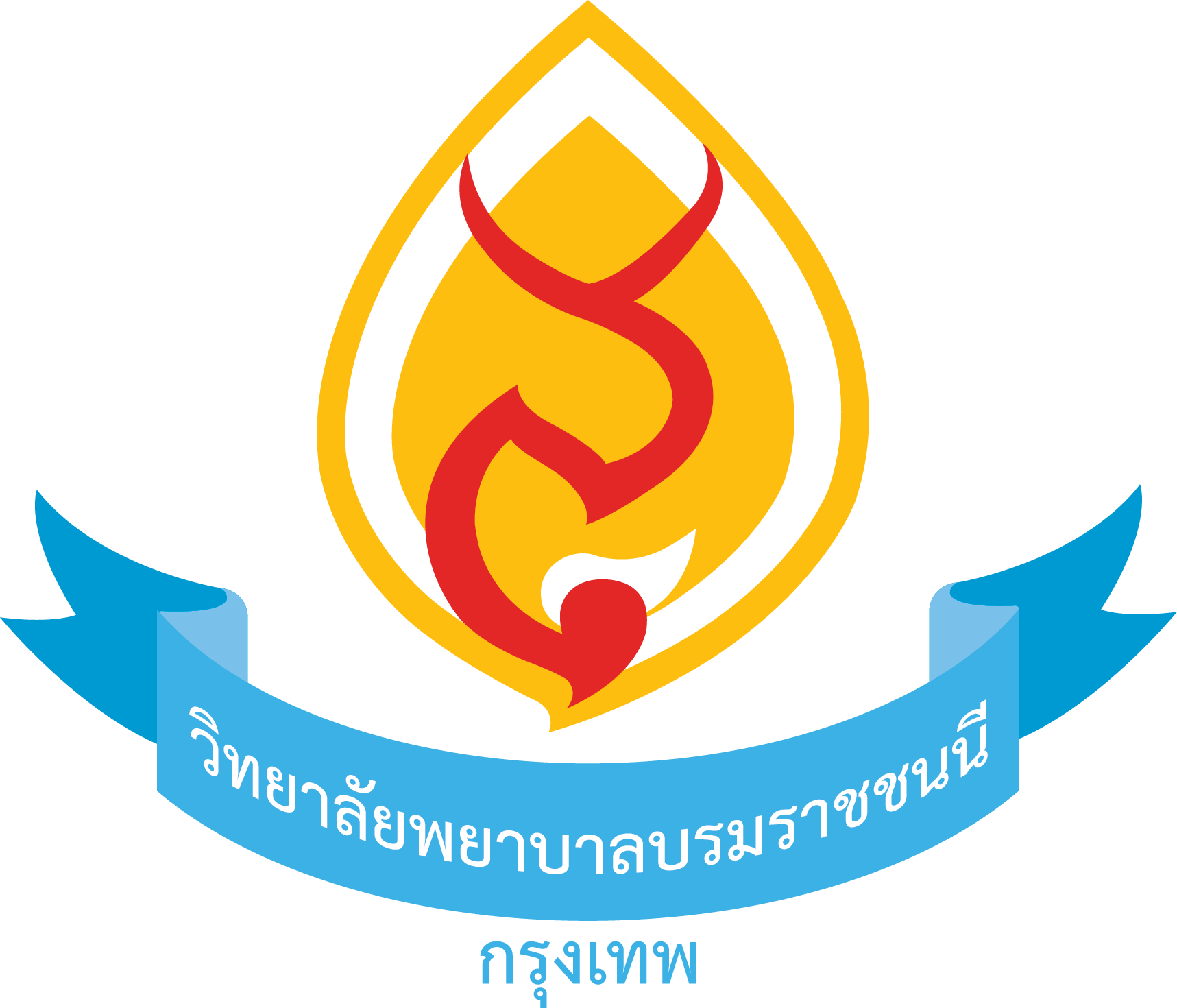Development and Preliminary Testing of the Spiritual Care Need Assessment Scale for End of Life Patients in Thai Cultural Context
Keywords:
development and preliminary testing, spiritual care need assessment scale, end of life patients, Thai cultural contextAbstract
This study aimed to: 1) develop spiritual care need assessment scale for end-of-life patients; and 2) synthesize the components of the scale using a mixed-method design divided to three stages. Stage 1 consisted of the following: a development of structure; and components and assessment items using the qualitative method (systematic synthesis of literature on spiritual care, in-depth interviews with end-stage cancer, and focus group discussions with families and professional nurses).Stage 2 focused on a scale quality testing by 17 experts in palliative and end of life care using the Delphi technique. Reliability was tested using Cronbach’s alpha coefficient, which yielded a reliability value of .89. Stage 3 aimed to develop and test a scale with 321 subjects to determine construct validity using the Varimax method. Focus group discussion was conducted with professional nurses to evaluate the instrument.
Results were as follows.
1) The findings could be summarized in 7 aspects (31 items) as follows: (1) meaning, value. and goals in living; (2) performance of activities consistent with religious beliefs, faith, and ceremony; (3) need for support to maintain human dignity; (4) opportunity to do the most important activities in life; (5) pas-life experience review; (6) need for a peaceful and painless departure; and (7) preparations for death. The components had eigen value at 1.053-9.631, and 64.156 % of variances.
2) The discussions with professional nurses found that assessment scale can be used to assess end-of-life patients’ needs. In addition, assessment handbooks and criteria should be prepared to enable patients to use the scales in assessments and guidelines for planning more effective care.
Downloads
References
2. World Health Organization. WHO Definition of Palliative Care [internet]. 2014. [cited 2015 December 3]. Available from: https://www.who.int/cancer/palliative/definition/en/
3. Jaturapatporn D. The method for assessment with Palliative Performance Scale (PPS). [internet]. 2015. [cited 2018 December 27]. Available from: https://med.mahidol.ac.th/fammed/th/ palliativecare/tools/doctorpalliative3th
4. Wisesrith W, Khungern J. The analysis of palliative care situations in Thai context. Journal of Gerontology and Geriatric Medicine 2006;7(3):12-20. (in Thai)
5. Daaleman TP, Reed D, Cohen LW, Zimmerman S. Development and Preliminary Testing of the Quality of Spiritual Care Scale. Journal of Pain and Symptom Management 2014;47(4):793-800.
6. Benito E, Oliver A, Galiana L, Barreto P, Pascual A, Gomis C, Barbero J. Development and Validation of a New Tool for the Assessment and Spiritual Care of Palliative Care Patients. Journal of Pain and Symptom Management 2014;47(6):1008-18.
7. Astrow BA. A Chinese Version of the Spiritual Needs Assessment for Patients Survey Instrument. Journal of Palliative Medicine 2012;15(12):1297-305.
8. Hocker A, Krull A, Koch U, Mehnert A. Exploring spiritual needs and their associated factors in an urban sample of early and advanced cancer patients. European Journal of Cancer Care 2014;23:786–94.
9. Blaber M, Jones J, Willis D. Spiritual care: which is the best assessment tool for palliative settings. International Journal of Palliative Nursing 2015;21(9):430-8.
10. Lin YL, Rau KM, Liu YH, Lin YH, Ying J, Kao CC. Development and validation of the Chinese Version of Spiritual Interests Related Illness Tool for patients with cancer in Taiwan. European Journal of Oncology Nursing 2015; 19:589-94.
11. Boonyarat J, Uppanisakorn S. The spirituality care in Intensive Patients and familys in Intensive Care Unit: Nursing Experiences. Princess of Narathiwat University Journal 2014;4(1):1-13. (in Thai)
12. Borneman T, Ferrell B, Puchalski CM. Evaluation of the FICA Tool for Spiritual Assessment. Journal of Pain and Symptom Management 2010;40(2):163-73.
13. Lin YL, Rau KM, Liu YH, Lin YH, Ying J, Kao CC. Development and validation of the Chinese Version of Spiritual Interests Related Illness Tool for patients with cancer in Taiwan. European Journal of Oncology Nursing 2015;19:589-94.
14. Shim EJ, Lee KS, Park JH, Park JH. Comprehensive needs assessment tool in cancer (CNAT): the development and validation. Support Care Cancer 2011;19:1957–68.
15. Leow M, Chan M, Chan S. Predictors of Change in Quality of Life of Family Caregivers of Patients Near the End of Life with Advanced Cancer. Cancer Nursing 2014;37(5):391-9.
16. Cobb M, Dowrick C, Lloyd-Williams M. What Can We Learn About the Spiritual Needs of Palliative Care Patients from the Research Literature? Journal of Pain and Symptom Management 2012;43(6):1105-19.
17. Kyle EK, Grace SC, Vineet A, David OM, Farr AC. Religiosity, Spirituality, and End-of-Life Planning: A Single-Site Survey of Medical Inpatients. Journal of Pain and Symptom Management 2012;44(6):843-51.
18. Currow DC, Allingham S, Yates P, Johnson C, Clark K, Eagar K. Improving national hospice/palliative care service symptom outcomes systematically through point-of-care data collection, structured feedback and benchmarking. Support Care Cancer 2015;23:307–15.
19. Sirilla J, Overcash J. Quality of life (QOL), supportive care, and spirituality in hematopoietic stem cell transplant (HSCT) patients. Support Care Cancer 2013;21:1137–44.
20. Charalambous A, Adamakidou T. Construction and validation of the quality of oncology nursing care scale (QONCS). BMC Nursing 2014;13(48):1-10.
21. Kaewmanee C, Nanthachaipan P, Sittisombut S. Spiritual Needs of Persons with Cholangiocarcinoma. Nursing Journal of the Ministry of Public Health 2014;15-28. (in Thai)
22. Vilalta A, Valls J, Porta J, Vinas J. Evaluation of Spiritual Needs of Patients with Advanced Cancer in a Palliative Care Unit. J Palliat Med. 2014;17(5),592-9. retical model of health behavior change. Perspectives on Sexual and Reproductive Health 2011;43(1):23-9.
Downloads
Published
How to Cite
Issue
Section
License
Article published Is the copyright of the Journal of Health and Nursing Research (Boromarajonani College of Nursing, Bangkok) Cannot be republished in other journals


















